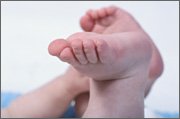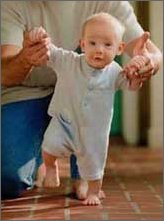Does Wearing Shoes Help a Baby Learn to Walk Sooner?
by www.SixWise.com
As parents anxiously await their child's first steps they often rush out to find the "perfect" new pair of shoes for their little tot. And why wouldn't they?
Everyone knows that wearing shoes will help a baby walk sooner -- for years pediatricians told us this.
Is there truth to this statement or is this just another old wives' tale passed on through generations?
|
Years ago shoe stores were stocked with the infamous hard sole, high-top white leather or vinyl shoes that were said to support a child's foot when walking. Today the shelves are covered with fashionable shoes, much like adult shoes, sporting name brands, fluorescent lights, bows, bright colors and cartoons.
|
Old Beliefs
If you were born 20 years ago or more, you are likely among the many adults who grew up wearing stiff high-top leather shoes as a toddler. At the time it was believed that toddlers had wobbly ankles and took flat-footed steps. Pediatricians acted on that belief and decided children needed extra support when learning to walk. Shoe companies heard the recommendations, agreed with the claim, and stocked their shelves with the stiff, high-topped baby shoes.
For many years, parents and pediatricians continued to believe this claim. It wasn't until a scientific study was done that confirmed what others suspected all along - those stiff, expensive shoes are NOT good for babies!
Sylvia Ounpuu, a movement specialist at the Connecticut Children's Medical Center, directed a study whose findings shattered the conventional wisdom that the first steps are flat-footed stomps. With the help of computer-assisted foot pressure sensors and a slow-motion video, researchers learned that even from their first steps babies walk with a rocking heel-toe motion, just like adults.
Babies do not need added support after all. Their ankles are strong and stable from the very beginning.
|

Lynn T, Staheli, MD, director of the department of orthopedics at Children's Hospital and Medical Center, Seattle, states "Shoeless populations have fewer foot problems than their shoe counterparts. And, according to current advice, babies who are just learning to walk should go barefoot, whenever possible, to maximize their balance and stability.
|
Bare Facts
The foot is a complex structure of 26 bones and 35 joints, held together and supported by many ligaments. A baby's foot is padded with fat and is highly flexible. When most toddlers start to walk, they have some poor muscle tone and weak ligaments in their feet, but this will improve over time as the feet strengthen.
So what shoes are best for a child's first steps?
None. Barefoot is best!
Experts say that a child's foot will develop more naturally the longer he/she is allowed to walk without shoes. It's important for parents to realize that the primary reason young children wear shoes are for warmth and protection. Children's bones, joints, and ligaments provide them with sufficient support for routine childhood activities.
According to Dr. Carol Frey, associate clinical professor of orthopedic surgery in Manhattan Beach, California, "Children are forced to walk with their feet further apart to keep their balance. Shoes are not necessary for support or development of the arch, they only protect the feet from the environment." She continues by saying "Going barefoot helps children develop stronger and more coordinated foot muscles."
|

Young children who are learning to walk are called "toddlers" because that's exactly what they do - they toddle. Typically, they keep their legs wide apart and seem to hesitate between each step, jerking from side to side as they move one foot forward, then the next.
|
First Steps
Most children take their first steps between 11 and 14 months, but the normal range for conquering this feat is very broad. Some tots walk as early as 8 months, others as late as 17 months.
All children develop at their own pace, and should not be pushed into something they are not capable of doing. If your toddler is a late walker, don't worry - the progression of skills is far more important.
If your child was a little late learning to roll over and crawl, chances are he'll need a few extra weeks or months for walking as well. As long as he keeps learning new things, there's no need to be too concerned.
When to Be Concerned
Remember, all children develop skills differently. During your child's routine physical exams, your pediatrician will likely talk to you about your child's developing ability to move. Consult your child's doctor if your child does not:
Keep in mind that toddlers who are heavier or that were born prematurely often learn to walk a little later than others.
Shoes for Warmth and Protection
Of course you want to protect your child's feet when you are away from home or when it's cold outside. When purchasing a pair of shoes for your toddler it's best to follow this advice:
-
Have the shoes professionally fitted - which should include measuring each foot for length and width.
-
Update their shoe size every few months as children's feet grow very quickly.
-
Be sure the shoes are not too tight -- this could alter your child's walking and cause ingrown toenails or bunions.
-
Find a shoe that has a soft, skid-proof sole -- to allow the muscles and arches to develop more naturally and gives the child more control over their movements.
-
Get a pair that has laces or Velcro -- something that will not allow your child's foot to 'slide out' of.